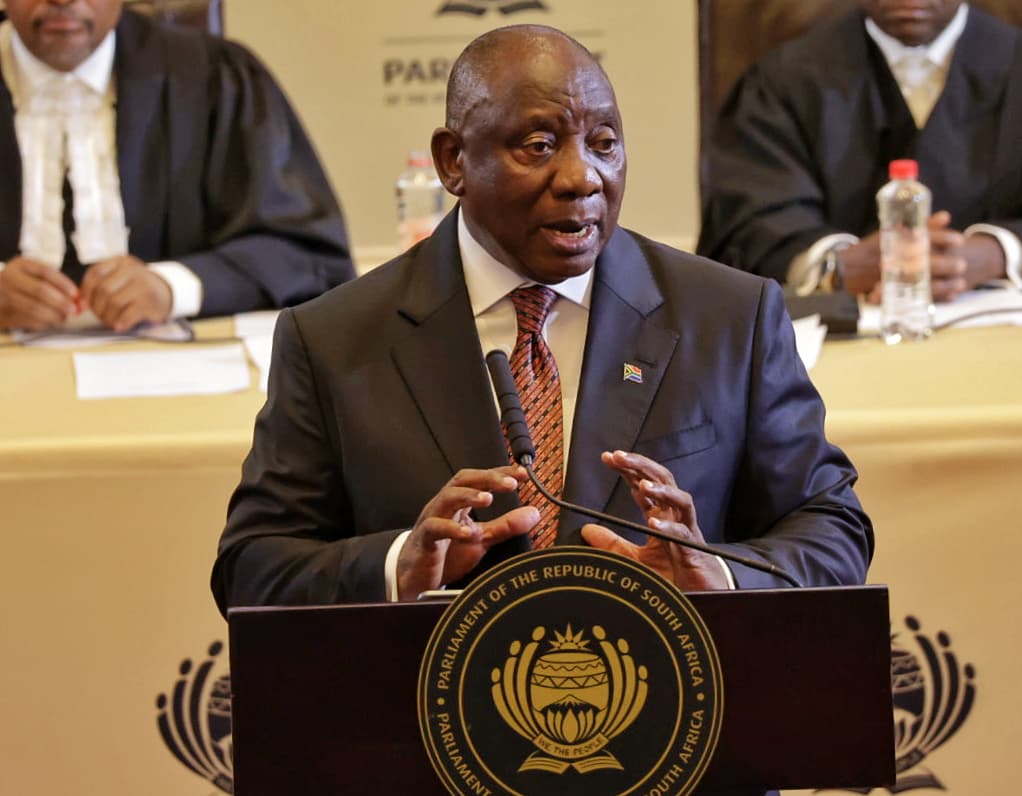By Simon Nare
President Cyril Ramaphosa stood firm against relentless attacks and threats of economic actions by the US President Donald Trump’s administration and vowed on Thursday that South Africa would not be bullied and would defend its sovereignty.
Delivering his State of the Nation Address in the National Assembly, Ramaphosa used the platform to hit back at Trump’s administration following criticism by the US president on the Expropriation Act.
Without mentioning it by name, Ramaphosa said while the global village was facing numerous challenges from climate change to geopolitical tensions and violent conflicts, the world was also witnessing the rise of nationalism and protectionism as well as the pursuit of narrow interests and decline of common cause.
“This is the world that we, as a developing economy, must now navigate. But we are not daunted. We will not be deterred. We are a resilient people. We will not be bullied.
“We will stand together as a united nation. We will speak with one voice in defence of our national interest, our sovereignty and our constitutional democracy,” he said.
He added that by staying true to the country’s values, harnessing its unique strengths and endowments and by forging a common purpose, the South Africa could turn these trying circumstances to its advantage and propel the country forward.
“As South Africans, we stand for peace and justice, for equality and solidarity. We stand for non-racialism and democracy, for tolerance and compassion
.
“We stand for equal rights for women, for persons with disability and for members of the LGBTQI community. We stand for our shared humanity, not for the survival,” he said.
Ramaphosa called on the nation to summon the spirit that collapsed apartheid regime and build a country that was united and diversified.
He said through partnerships, peace and democracy were brought to the country.
He added that SA overcame apartheid and state capture and rebuilt the country after the devastating Covid-19 pandemic.
“Together, we have built durable institutions that support our democracy, protect our fundamental rights and promote the well-being of South Africans. We have built meaningful partnerships between government and business, labour, civil society and other social partners to drive growth and development,” he said.
The president said these achievements stood as models of cooperation for the rest of the world, and the country must continue to work together and confront its challenges and build a nation that worked for all.
These efforts must be guided by the wishes of the people expressed in last year’s elections which led to the formation of the Government of National Unity.
Ramaphosa said the executive adopted the Medium-Term Development Plan last week. It sets out a clear programme for the next five years.
The aspirations contained in the plan will advance the GNU’s three strategic priorities – drive inclusive growth and job creation, reduce poverty and tackle the high cost of living, and build a capable, ethical and development state.
“Our most urgent task is to grow our economy so that we can create jobs, reduce poverty and improve the lives of all South Africans. To undertake this task, we need a government that works for the people.
“We need a state that is capable and competent, underpinned by a professional public service. South Africans want a state that treats all people with dignity, humility and respect,” he said
The country deserved leaders who were prepared to serve its people with complete dedication, and public servants who were ethical, skilled and properly qualified, he said.
For these objectives to be achieved, the government would strengthen the role of the Public Service Commission in the appointment of key people who directed the affairs of our state such as directors-general, deputy directors-general, CEOs and board members.
He added that the government would introduce a graduate recruitment scheme so that it could attract the best and the brightest into the public service.
Ramaphosa said to create a thriving economy that benefited all, the country needed to lift its economic growth to above 3%. To achieve a higher level of economic growth, the government was investing new infrastructure while upgrading and maintaining the existing ones.
“We are developing innovative ways of funding infrastructure. We are engaging local and international financial institutions and investors to unlock R100 billion in infrastructure financing. A project preparation bid window has been launched to fast-track investment readiness,” he said.
INSIDE POLITICS

